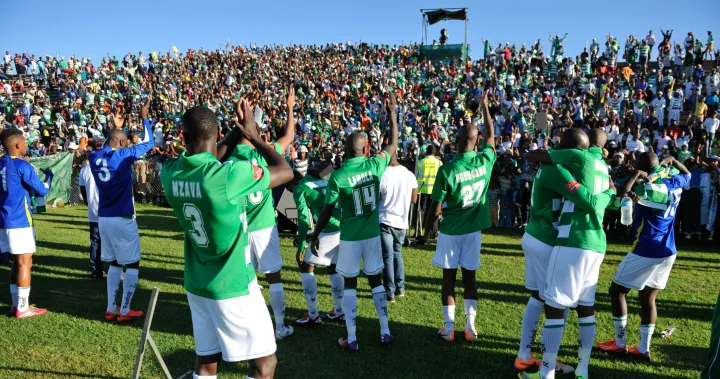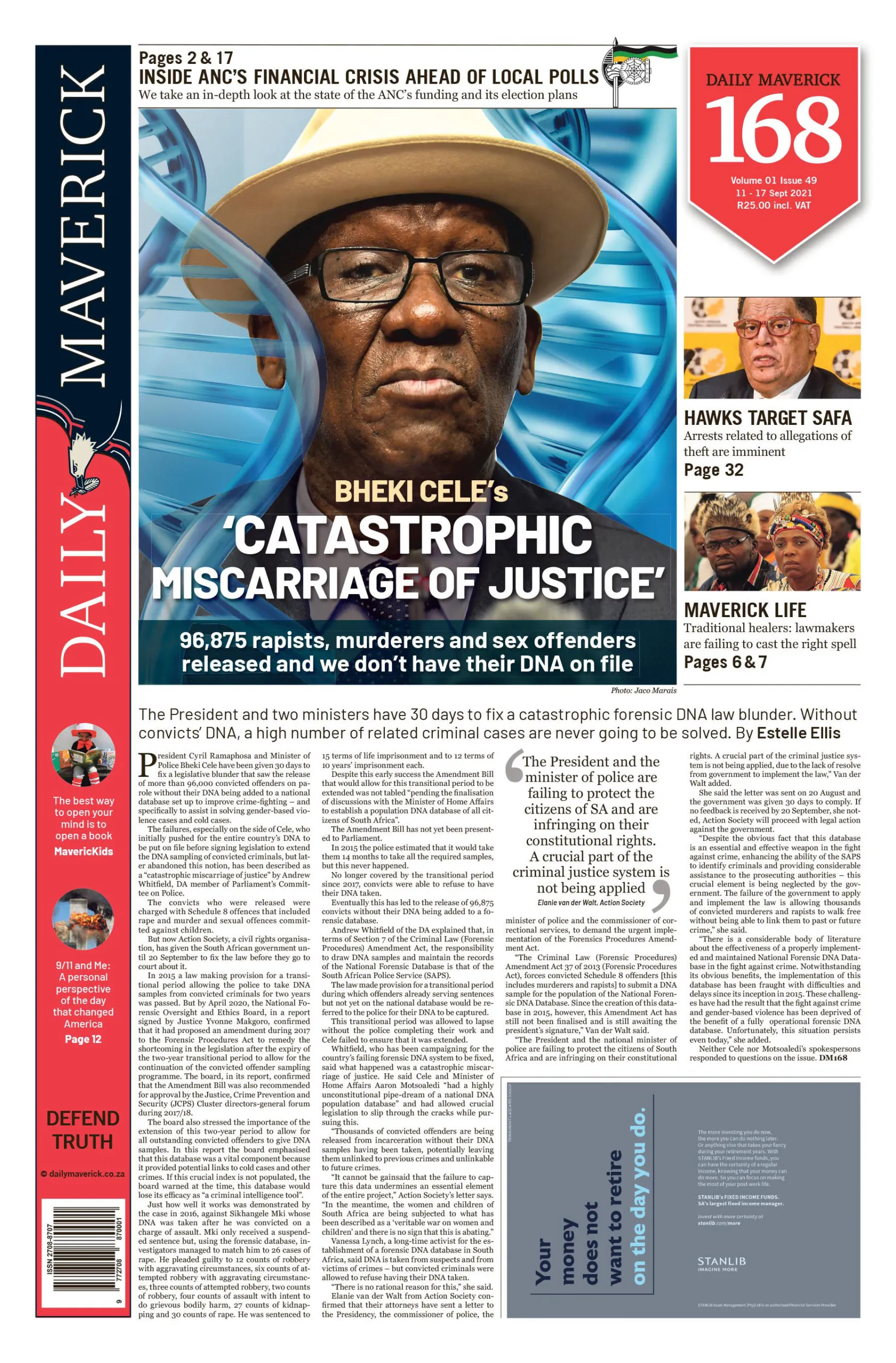DM168 SPORT
Swift sale of Bloem Celtic breaks more than just the hearts of Siwele

In central South Africa, in Bloemfontein, the seat of the Mangaung municipality and the Free State’s capital, there were two reasons one would encounter the who’s who of South African society.
First published in the Daily Maverick 168 weekly newspaper.
The first, often more nefarious, reason would be when said persons were attending a case at the Supreme Court of Appeal, the second-highest court in the land.
The other, more virtuous, reason would be the final day of Macufe, Bloemfontein’s flagship sporting festival. It always ended on a high with local heroes Bloem Celtic playing Kaizer Chiefs for the Sparta Macufe Cup, in a one-off “winner takes all” football showcase.
But with the stroke of a pen and a cheque for R50-million – for that is what the parties involved deemed to be the total worth of 52 years of sporting and cultural heritage – all that is gone now.
Controversial KwaZulu-Natal business-person Shauwn Mkhize has bought Bloem Celtic, renamed it Royal AM and relocated the club to Durban, where its matches will take place this season.
This unsporting yet legal practice of buying and selling Premiership football status in the elite Premier Soccer League (PSL) is nothing new. It is often the preserve of “tenderpreneurs”, the nouveau riche who have acquired their wealth by hook or by crook and want to demonstrate just how deep their pockets are. This may or may not be what has happened here, but the signs are all too obvious to be ignored.
It has happened before and it will certainly happen again, but what is not clear are the rules of engagement when such transactions are done.
In England, which has one of the most popular and lucrative elite football leagues in the world, there is a process called the “owners’ and directors’ test”. This is used to scrutinise those intending to buy clubs and preserve the integrity of the game. Locally, it is not certain what guidelines, if any, exist.
What is a fact, though, is that football is South Africa’s national sport, capturing the hearts and minds of all and sundry, and companies fall over each other to sponsor and align their products and services to football teams and players.
Bloem Celtic have become the latest victims of this practice, with their Premiership status – and, by extension, the club itself – having been bought just a few days into the new season. The buyers are the owners of Royal AM, one of the most flamboyant clubs to emerge in the national First Division, officially known as the GladAfrica Championship.
Neither the owners nor Royal AM are new to controversy. They were recently charged for various transgressions and ostensibly “bringing the game into disrepute”. They were found guilty of all charges by the PSL’s disciplinary committee, and were still awaiting their punishment when this transaction was approved by the league’s executive committee. Dubious, right? Right.
This transaction has left a bitter taste in the mouths of many football aficionados, and not just those who supported Bloem Celtic.
To put it into context, the club was founded in 1969 and it has been recognised as one of the founding clubs of the PSL back in 1997.
Celtic had only been relegated once, in 2001, and after a three-year absence bounced back in style, regaining PSL status in the 2003-2004 season and winning the SAA Supa 8 in 2005.
Celtic’s adoring supporters affectionately called them Phunya Sele Sele, derived from the longer Phunya sele sele bana bao shebile, which is thought to have originally referred to one of their star players but came to include the whole team.
It was fine-tuned to Phunya sele sele bantwana bao shebile, but the meaning stayed the same: “Score against the opponent, the ladies are watching you.” Here it is clear that the fans decided – and had the final say – in what their club would be called.
The fans themselves, called Siwelele, gained a reputation as model football supporters, commanding the respect of lovers of the beautiful game all over the country as the quintessential 12th player, singing and dancing from start to finish, regardless of whether the team was winning or not.
I lived in Bloemfontein from 2012 until 2017. As soon as I arrived, I bought my green-and-white-striped replica shirt at a local store and attended football matches whenever I could.
I went to matches in the Free State Rugby Stadium, in the former Seisa Ramabodu Stadium, the club’s official home ground that was renamed in 2015 after its much-loved former owner to become the Dr Petrus Molemela Stadium, and one time, even in the Mmabana Stadium in Thaba ’Nchu.
Before moving there, I had heard wonderful stories about Siwelele – and they were all true. I learnt the songs, at least the parts I could pronounce. I learnt the dances, or the parts my two left feet could manage.
I enjoyed every moment of being among the vivacious, euphoric and ever-colourful Siwelele. The camaraderie and football culture were second to none.
The supporters composed songs of endearment for their team, their players and even for their opponents. They choreographed elaborate dances, creating a rich, tangible and intangible cultural and sporting heritage.
Phunya Sele Sele were more than a football team. They were the “soul of the city”.
But this will be no more. The PSL is reputed to be the richest and most professionally run league on the African continent, and it has, as usual, put profits before people.
The formal explanation given was that, if the sale had not happened in the way it did and as swiftly as it did, there would have been only 15 teams competing in the PSL.
There were no public participation processes, no impact assessments. There were no outreach meetings with fans. For a “legacy football club”, it is the least that could have been done.
Fans were caught unaware and – I hope I’m wrong here – the likelihood of their rebirthing another Bloem Celtic seems a near-impossible task.
Going forward, a set of rules must be developed. The start must be a sporting or football compact that must take into account the voice of the custodians of the game, the supporters, before that of any other stakeholders. Siwelele, for their indelible contribution to the PSL football culture, deserve no less.
What has been lost is not just Bloemfontein Celtic Football Club, but that sacred connection cultivated over years between the Siwelele and Phunya Sele Sele.
Some critics have said the sale will have an adverse impact on the formal economy, with the Dr Petrus Molemela Stadium, renovated for more than R400-million and owned by the Mangaung municipality, becoming a white elephant. Hotels, real estate and retail will all take a knock.
Heartbreakingly, the informal economy, the people, mostly black women who relied on Celtic’s football matches to sell food and paraphernalia to support their families, have been left high and dry.
What cannot be denied is that the selling and relocation of Bloem Celtic to KwaZulu-Natal will have long-term effects, some of which we cannot yet fathom.
Those orchestrating the “palace coup” or “hostile takeover” that allowed this to happen must be described in these terms for history to record what really happened.
In the hearts and minds of the Siwelele, it is a case of Phunya Sele Sele are dead. Long live Phunya Sele Sele. DM168
This article was first published by New Frame.
This story first appeared in our weekly Daily Maverick 168 newspaper which is available for R25 at Pick n Pay, Exclusive Books and airport bookstores. For your nearest stockist, please click here.




















 Become an Insider
Become an Insider
Comments - Please login in order to comment.